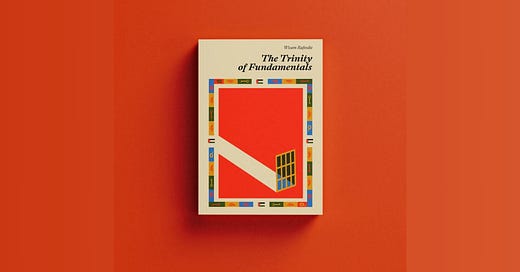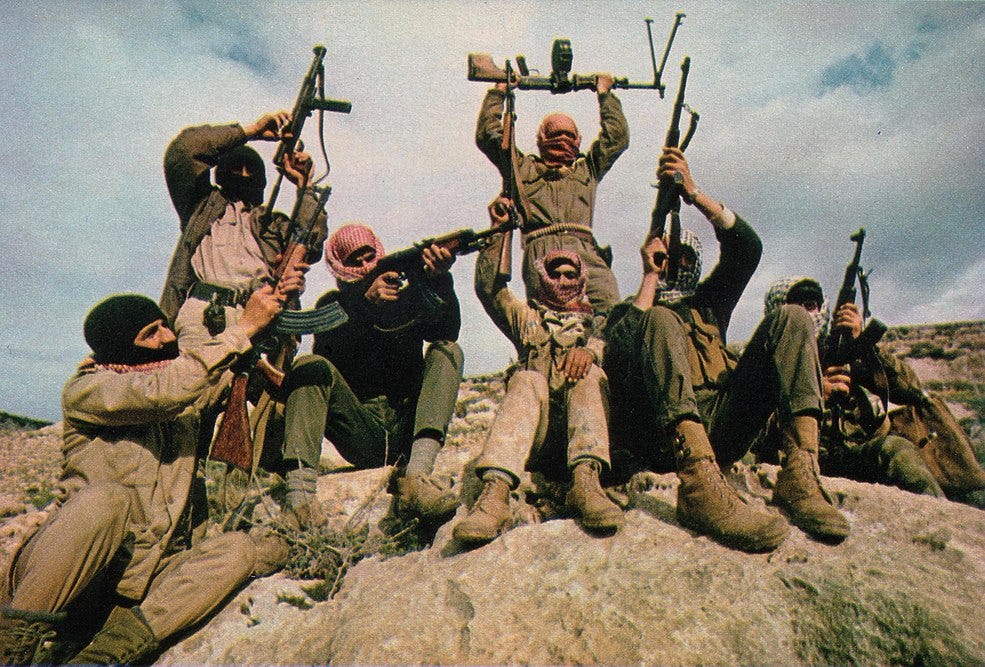Guess who’s back? (yeah…. it’s me!)
Hey there! I know, I know—it’s been a minute since I dusted off this Substack. But what better way to break the silence than with a brand-new post? Just dropping my review of The Trinity Of Fundamentals by Wisam Rafeedie, since Instagram is………a bit weird.
Thanks for sticking around—I’ll try not to make this a once-a-year occasion.
Catch you on the other side of the read!
There are books, and then there are books that can teach you how to live. Trinity of Fundamentals is the latter. It is an embodiment of resistance, hope, and introspection, written in the most unimaginable circumstances and preserved through collective revolutionary determination.
Wisam Rafeedie wrote this book in 1993 while imprisoned by the occupying forces in Naqab prison. The manuscript survived Israeli surveillance because it was smuggled between cells and prisons in pill capsules and bread dough, copied by hand by fellow prisoners, who ensured its survival even after the original was confiscated. At one time, even Rafeedie thought his work was lost forever, but it was circulating through the prison system, being read and cherished by countless other Palestinian prisoners, inspiring solidarity and revolutionary hope as it moved from one cell to another.
The story of the book’s creation mirrors its contents.
What Is A Revolution And Who Is A Revolutionary?
The Trinity of Fundamentals is not just a story about revolution but a revolution in how we think about revolutionary practice itself. Through Kan'an's journey, Rafeedie explores what it truly means to be a revolutionary, as he transforms nine years of underground resistance into a profound meditation on revolutionary consciousness. This account is not a romanticized version that often captures our imagination. It is exhausting, repetitive, and nerve-wracking. As Kan'an warns us himself,
"Beware of romanticizing my world, my revolution is anything but."
We're shown how revolution can be a practice of constant vigilance, of missed connections, of conversations with walls, and of unwavering ideological commitment despite the crushing weight of isolation.
What makes this account particularly striking is how it navigates the space between the extraordinary and the mundane. While Kan'an moves from safe house to safe house, evading capture, and ensuring the continuity of his party PFLP, he also cooks, dreams, and contemplates. His revolution exists in both the grand gestures of resistance and in the quiet moments of reading borrowed books or humming remembered tunes. Rafeedie masterfully shows us the duality of how revolutionary practice can be simultaneously distant from and intimately connected to our everyday lives.
Some Takeaways
The philosophical core of the book lies in what Rafeedie calls the "trinity of fundamentals" - life, revolution, and love.
These are not abstract concepts but living forces that push and pull against each other. The tension between them creates the revolutionary subject: someone who must constantly negotiate between personal needs and collective struggle, between the desire for connection and the demands of resistance, between living in the present and fighting for the future.
One of the most profound takeaways from the book is its uncompromising hope. Rafeedie constantly and compellingly reminds us of his optimism for the future. Having personally struggled with maintaining hope—often dismissing it as naive optimism—I found Rafeedie's perspective transformative. He showed me how hope itself is a form of resistance. It is both humbling and galvanizing; if people, who are actively resisting the death machines of this world in conditions of utter deprivation, can remain resolute in their hopefulness, how have we convinced ourselves of the ‘futility’ of ‘resisting’? What is our excuse for giving up?
This book is for anyone trying to understand what it means to resist oppression and fight for collective liberation. It challenges you to confront the sacrifices inherent in resistance and to recognize the profound humanity at its core. By exploring the trinity of life, love, and revolution, Rafeedie compels us to reflect on our own capacity for hope and action in the face of injustice.
The Trinity of Fundamentals is an essential reading for anyone who believes in the enduring capacity of humanity to fight for justice (trust me, you WILL come out more hopeful). It will show you exactly how revolution is not just about grand gestures but about the daily choice to resist, to love, and to live despite everything.






